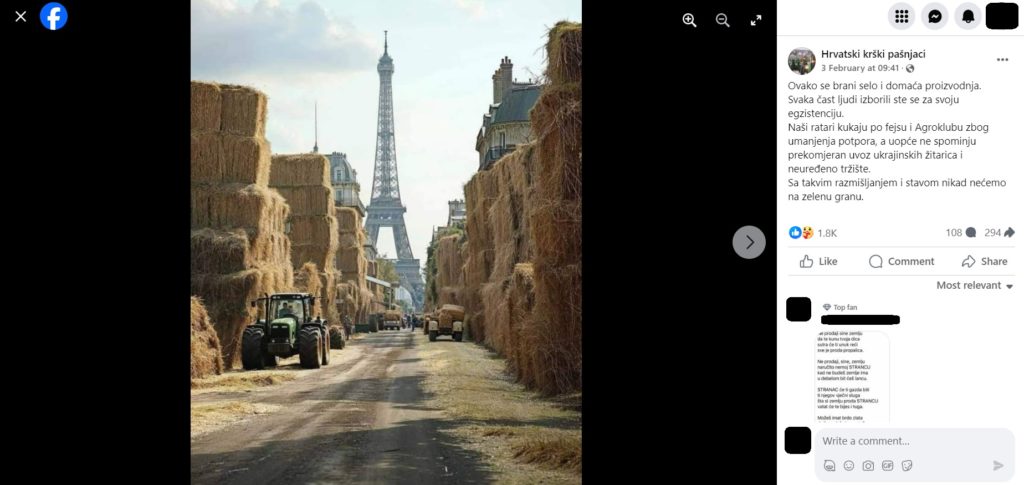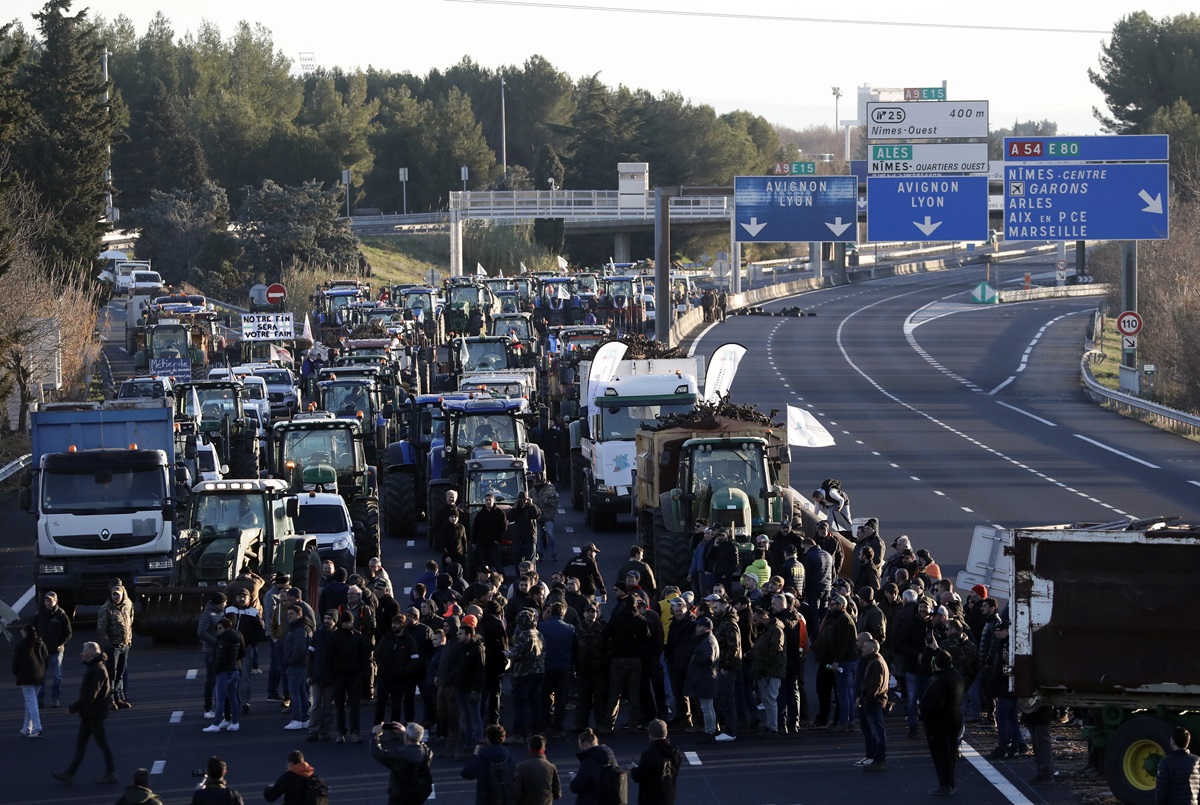Original article (in Croatian) was published on 5/2/2024; Author: Ivica Kristović
Last week, farmers in France did indeed block roads. However, the circulating photo was created using the Midjourney tool.
On February 3, a Facebook profile named “Hrvatski krski pasnjaci” shared a photo (archived here) depicting a tractor and a stack of hay bales in front of the Eiffel Tower in Paris, with the caption:
“This is how the village and local production are defended. Kudos to you people, you fought for your existence”.

AI-generated photo
The photo shared in the status is not genuine; it does not depict an actual event but was created by an artificial intelligence tool. The original photo was first published on February 1st on the ifonly.ai Instagram profile (with an archive available here).
The accompanying message alongside the photo suggested that French authorities should listen to the farmers’ demands. It then explicitly mentioned that the photo was produced by the AI tool Midjourney, with a caution against misinformation: “Disclaimer: This series was generated by AI on Midjourney. To prevent any « Fake news » related to the above photos, please specify when sharing that these are not real but AI-generated images,” the original post stated. Despite this advisory, the caution was not heeded, leading to the misleading presentation of the photo as depicting a real event.
Farmers’ Protests in France
While the image of hay bales in front of the Eiffel Tower in Paris is artificial, the protests by French farmers last week were very much real. As reported by France24, French farmers took to the streets for over a week, employing tractors to obstruct roads leading to Paris and other significant French cities.
The status from “Hrvatski krski pasnjaci,” which was shared alongside the AI-generated photo of the Paris protests, expressed a critique: “Our farmers are lamenting on Facebook and Agroclub about the reduction of subsidies, without addressing the significant issues like the excessive importation of Ukrainian grains and the resulting market disorder. With such a mindset and approach, we will never move onto greener pastures.”
There is a whole range of reasons why French farmers took to the streets, ranging from the financial burdens of adhering to stricter environmental standards to the challenge posed by inexpensive imports of agricultural products from outside the European Union, notably Ukraine. The escalation of protests led to significant disruptions until last Thursday when the two largest farmers’ unions decided to call for a cessation of protests. This decision came after French Prime Minister Gabriel Attal pledged financial support, regulatory relief, and protection against unfair competition.
Marc Fesneau, the French Minister of Agriculture, optimistically noted last Friday that “the worst of the crisis is behind us.” Following this announcement, authorities reported that many of the roadblocks set up by protesting farmers were dismantled by Thursday evening, though some farmers continued to mobilize tractors on Friday. Additionally, during last week’s European Council meeting in Brussels—which saw protests from farmers across several countries—French President Emmanuel Macron revealed that discussions with Ursula Von der Leyen, the President of the European Commission, led to an agreement on the necessity of imposing stricter regulations on the importation of grains and poultry, including those from Ukraine, to protect EU farmers.
However, the government’s announcement that it will pause its Ecophyto program, whose goal was to massively reduce the use of pesticides in agriculture, is cited as a key move to end the farmers’ protests in France.
Fear of an agreement with the South American bloc of states
Another significant concern fueling the “peasant revolt” in France is the apprehension regarding the European Union’s negotiations for free trade agreements with various countries and regional blocs. As reported by France24, the European Union has actively engaged in signing free trade agreements over the past years to facilitate the exchange of goods and services. Some non-EU countries, including Norway, Liechtenstein, and Iceland, are already part of the European Economic Area, which allows them to have free trade agreements with the EU. Additionally, countries such as Canada, Japan, Mexico, Vietnam, and Ukraine have established such agreements with the EU. More recently, the EU has signed agreements with Kenya and New Zealand, while negotiations are underway with India and Australia.
The biggest concern for French farmers is the potential agreement between the European Union and the South American Mercosur bloc, which includes Argentina, Brazil, Uruguay, and Paraguay. This worry arises at a time when the EU is pushing for its farmers to engage in more sustainable farming practices. French agricultural unions argue that such agreements would pave the way for significant imports of cheaper products that do not adhere to the same stringent environmental standards as those produced within the EU. They fear this would lead to unfair competition from South American producers, who are not subject to the same restrictions on the use of genetically modified organisms (GMOs) seeds and antibiotics that are banned in the EU.
The Office of the French President announced last week that due to France’s opposition, the EU suspended negotiations on an agreement with the South American bloc. After signing, and before that agreement enters into force, it must pass a vote in the European Parliament and be ratified by all 27 members of the European Union.
Despite the French government suggesting that these agreements could offer numerous benefits, the French Prime Minister announced last week the country’s opposition to signing any agreements with the South American countries. Following France’s stance, the Office of the French President revealed that the EU has suspended negotiations with the Mercosur bloc. It’s important to note that any such agreement, once signed, must undergo a vote in the European Parliament and receive ratification from all 27 member states of the European Union before it can take effect.
Protests across Europe
The protests in France form part of a broader wave of farmer demonstrations across European Union member states, which have been escalating over recent months. These protests reached a peak last week with a significant gathering in Brussels during a meeting of European state leaders.
The Guardian wrote in its text that farmers’ protests have taken place in Greece, Germany, Portugal, Poland and France in recent months. While some demands are specific to individual countries, some of the common problems of the agricultural sector in the EU, which have led to protests, are falling selling prices, rising production costs, rigorous regulation, a powerful trading sector, debts, climate change and cheap imports from non-member states of the union.
According to The Guardian, similar protests have occurred in Greece, Germany, Portugal, Poland, and France in recent months. While some of the grievances are unique to each country, there are common challenges facing the agricultural sector across the EU that have sparked these demonstrations. Among these challenges are falling selling prices and rising production costs, which squeeze farmers’ margins. Additionally, farmers are grappling with rigorous regulatory frameworks that often increase operational difficulties and costs, a powerful trading sector, debts, climate change and cheap imports from non-member states of the union.



